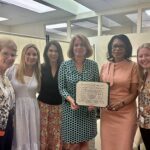When faced with an ailing mother and husband, Karen Schief became a caregiver.
“At that point, I didn’t even know there was a name for what it was we did,” the Syosset resident says of caregiving.
Years later, Caring for the Caregiver, for which Schief serves as cochairman, began as a ministry at her church and now runs caregiving caring circles, as well as keeping a comprehensive database of support systems available to caregivers.
Caring for loved ones is a growing issue. According to The National Alliance For Caregiving and AARP, approximately 34.2 million people have provided unpaid care to an adult 50 years or older in the year 2015, the last year for which statistics are available. Further, the 2010 U.S. Census Bureau reports that one in every 26 families in the U.S. is raising a child with a disability.
Care for the Caregiver
Caregiving offers an opportunity to express love and compassion, but there are concomitant negative aspects. Most feel isolated and forget what life was like before being a caregiver, says Tara Anglim, director of Patient & Family Center Care at Peconic Bay Medical Center, a hospital-based caregiver support center on Long Island. Support group members, adds Anglim, validate each other’s emotional experience of caregiving through laughter, united feelings of frustration and sadness.
At Caring for the Caregiver, caring circles are non-disease specific. “We found that there were many people who were facing multiple issues,” says Schief. The caregivers themselves run the caring circles, explains Schief, “because if you have never been a caregiver you don’t understand what these people are going through.”
Caring for Children & Families
North Shore Child & Family Guidance Center offers an Intensive Support Program (ISP) of therapy and a nurturing alternative for children ages 5 to 21 and their families from all Nassau county school districts.
Part of the work of ISP, says Andrew Malekoff, executive director of the Guidance Center, involves providing psychoeducation for the child and parents to develop the coping skills necessary to improve their overall functioning at school, in the community and at home.
Parent to Parent, based in Hauppauge, provides information, guidance and support to families of children with developmental disabilities. Parent to parent matching, a popular program, connects parents in need of advice to other parents who’ve been through similar experiences.
Alzheimer’s Disease
In New York State, there are now one million Alzheimer’s and dementia unpaid caregivers. These figures are poised to rise as the number of people diagnosed with the disease is expected to triple by 2050.
In many cases, people care for loved ones at home for as long as they can and need their own support services, says Charles J. Fuschillo, Jr., president and CEO of the Alzheimer’s Foundation of America.
“Respite can be an invaluable resource to help family caregivers maintain their own sense of well-being,” he says, adding that respite can take the form of adult day programs and in-home aid.
Education is also key. Classes like Peconic Bay Medical Center’s “Dementia: Effective Communication and Behavioral Strategies” and “Long Term Care 101” are vital for proper care.
No matter who they care for and what conditions they’re contending with, help for the caregiver is available.
“We’re trying to make their journey easier,” says Schief.
caregiving on long island













